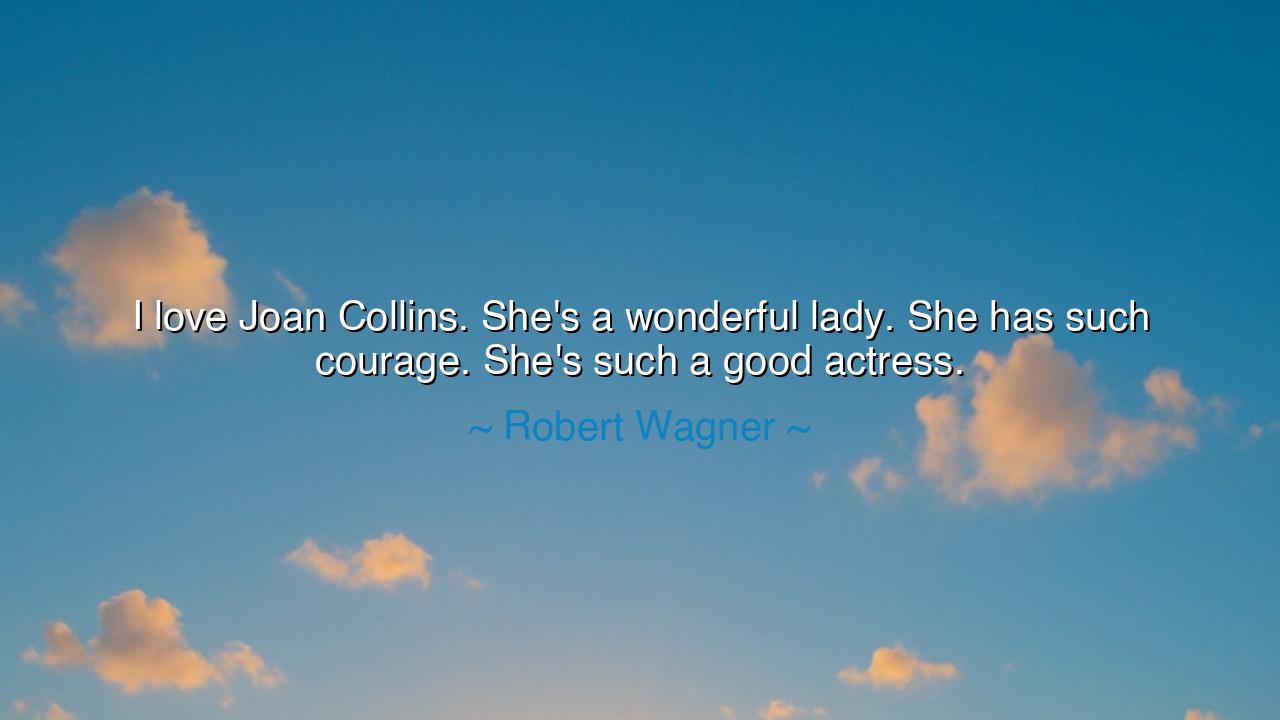
I love Joan Collins. She's a wonderful lady. She has such
I love Joan Collins. She's a wonderful lady. She has such courage. She's such a good actress.






The actor and gentleman Robert Wagner, whose long life in the theater of Hollywood has made him both witness and sage, once said: “I love Joan Collins. She’s a wonderful lady. She has such courage. She’s such a good actress.” Though the words appear simple, they carry a quiet depth, for they are not merely a tribute to one woman, but a hymn to courage, to grace, and to the enduring strength of the artist’s spirit. In the shimmering world of fame — where beauty fades, applause wanes, and hearts are often tested — such praise holds the weight of truth. It is not admiration for glamour, but for resilience, for the rare ability to face life’s storms without losing one’s poise or one’s purpose.
The origin of these words lies in the long friendship and shared experience between two souls of cinema — Robert Wagner and Joan Collins. Both were children of Hollywood’s golden age, when success glittered brightly but came at a price. They had seen the rise and fall of careers, the fickleness of fortune, and the loneliness that often hides behind fame. When Wagner spoke of Collins as “a wonderful lady” with “such courage,” he was not praising her artistry alone, but her tenacity — the inner light that allows a person to endure the shifting tides of time and public opinion. For courage, in the truest sense, is not found in the grand gesture, but in the quiet persistence of living one’s truth amid the noise of the world.
Joan Collins herself is a testament to this truth. Through decades of triumphs and trials, she has worn many crowns — actress, writer, survivor, icon — and yet she has remained fiercely herself. In an industry that often discards women with age, she refused to be diminished. She faced heartbreak, scandal, and loss, but never yielded to bitterness. Her courage was not the courage of war or politics, but the rarer kind: the courage to keep shining when the world tells you your light should fade. Wagner’s words recognize this spirit — the heroism of endurance, the dignity of one who walks through both adoration and criticism with the same unshaken grace.
The ancients, too, would have honored such courage. They would have likened her to Antigone, who stood for her convictions against the decree of kings, or to Penelope, who wove by night and waited by day, steadfast and unbroken. In their wisdom, they saw that courage wears many faces — sometimes the armor of warriors, sometimes the elegance of those who persevere with heart unbowed. To live in the public eye, to offer one’s soul through art, to be judged and yet to continue — this is a modern form of valor. It is the same courage that allowed Joan of Arc to follow her voice through fire, and Eleanor Roosevelt to stand against prejudice and fear. Each of these women, in her own age, embodied the same timeless truth Wagner saw in Collins: that courage is grace under pressure.
Wagner’s admiration also reminds us of the power of respect — the noble recognition of virtue in others. In a world that too often celebrates power over goodness, his words restore balance. He praises not her fame, but her character; not her beauty, but her bravery. He recognizes that art and courage are inseparable, for no great artist can exist without daring. Every performance, every creation, is a risk — a leap into the unknown. The artist must bare the soul, open the heart, and accept both love and rejection. Thus, Wagner’s tribute becomes a lesson for all: honor those who live with courage, for they hold a mirror to our highest selves.
And yet, his words speak beyond the stage. They call to each of us, reminding us that in every life there comes a moment when we must choose courage over comfort, integrity over approval. The courage of Joan Collins — and of all who persist in truth — is not reserved for the famous. It belongs to the mother who raises her children alone, to the teacher who stands against injustice, to the elder who faces age with dignity. It belongs to every soul who refuses to surrender their light, even when darkness presses close.
Let this, then, be the lesson passed down: to live with courage is to live with authenticity. Be steadfast in who you are, as Joan Collins has been. Celebrate the beauty of others, as Robert Wagner did — for admiration, when born of sincerity, uplifts both giver and receiver. When life’s applause fades and its trials begin, hold fast to grace. And when you encounter those who walk with quiet strength, honor them, for they are the true nobility of this world.
Thus, the quote of Robert Wagner becomes more than remembrance — it becomes a parable of courage. It teaches us that greatness lies not in acclaim, but in constancy; that the finest performance is not on the stage, but in the way one lives. And so, as the ancients would say: Honor the courageous, for through their endurance, the world learns how to stand tall.






AAdministratorAdministrator
Welcome, honored guests. Please leave a comment, we will respond soon